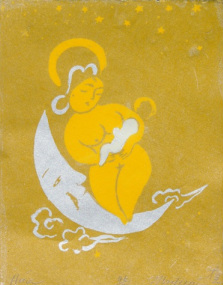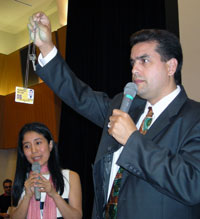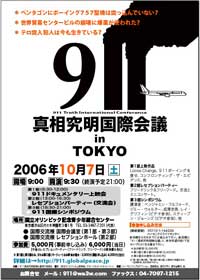 Check out the Vancouver Sun news story from Canada below)
Check out the Vancouver Sun news story from Canada below)The Japanese government is again trying to deny what Japan did during the WW2 to many Asian young women (mostly teenagers). They ABDUCTED them (yes, most of them were children, some of them hadn't started menstruating yet!) from Korea, China, The Philippines, Indonesia, etc, and put them into the Japanese Imperial Army's Ianjo (some call it "Rape House") and forced them serve as sex slaves. It can not be denied.
Our government says the purpose of having the "Ianjo(Rape House)" was not to cause adversity to local people in the cities and villages that we were invading by raping any of the local women there. This is what many soldiers do even today! Sure, the INTENTION may have been good, (actually, they should NOT HAVE INVADED in the first place! And rape is not permissible anywhere, anytime. This goes without question! We should MAKE LOVE, not rape and definitely not war!) but what about those young girls and their families who suffered so much?
Those women who survived this incredible cruelty are now in their 70s and 80s, and I can not imagine how they must have felt hearing our Prime Minister Shinzo Abe denying the fact and hurting those old women who are now slowly dying from old age. For them hearing such words must be like being raped again.
Please read some of those stories here and also the letter below to Prime Minister Abe about one of the comfort women, Lila Pilipina.
--------------
Saturday, March 10, 2007
Dear Prime Minister Shinzo Abe: Join Me
March 7, 2007
The Eve of International Women's Day
An Invitation to Japanese Prime Minister Shinzo Abe
Dear Prime Minister Shinzo Abe,
We have never met, but I invite you to meet the women of LILA Pilipina. On March 2, 2007 you announced, "There is no evidence to prove there was coercion, nothing to support it (the coercion of WWII military sex slaves)." I've been working with surviving WWII Comfort Women of the Philippines since 1998. Let me take you to Lolas' House, a tiny cottage in Quezon City, Manila where women meet and gather the evidence you need to prove there was, indeed, coercion.
If 81-year old Pilar Frias is there, she will tell you that in 1942 she had two bouts with Japanese soldiers before she was taken captive. During the first intrusion, soldiers cornered her and shouted in a foreign tongue. Confused, Pilar didn't react. Frustrated, a soldier took his cigarette and held it to her face, tipped the lighted end and burned a hole into her skin. She cried out and the soldier, angry that she should be displeased drew his knife and sliced her nose. Blood poured from her face and as she cried he yanked her by the hair and shoved her head deep into a bin of water. The blood blossomed in a cloud of red. The soldiers stole the family's livestock – a cow, some chickens and pigs. They raided their supply of rice and other dried goods. During the next invasion, they raped her five times – each time it was a different soldier. 17 years old and bleeding, they tied her at the waist and dragged her along with three other girls.
She was made to follow them as they hunted down Philippine guerillas. Strung together by a sturdy hemp rope, the four girls were raped every night, five times a night, a different soldier every time.
Perhaps her words are not proof enough. Then give me your hand. Sometimes when the women tell their stories and they trust that you are listening, they will guide your hands to touch their wounds. Pilar Frias has a wide flat nose and a scar that runs the length and width of it. If you run your fingers along the line of that scar, you can actually feel where the bayonet sliced her. If you run your hands along her waist, you will see the fall and rise of scars where ropes burned her skin as she was dragged through the forests with three other young women and raped each night.
Is this not evidence of coercion?
Since 1993 the women of LILA Pilipina have come forward to the dismay of their families. They have marched the streets and filed petitions to acknowledge the crimes that were placed on their bodies, on their spirits and on the rest of their natural lives. They have traveled to Japan and appeared in your courts to tell their personal stories of sexual abuse. This is not an easy thing to do. If you understand the culture of shame that comes with such experiences, you know that their presence in this house in Quezon City, or at the gates of the Japanese Embassy in Manila, or in your country's courts is evidence enough.
The women are in their eighties, and yes, they are dying. When they are gone it will be much easier to pretend that these wartime atrocities never happened. But women like Pilar Frias have many friends and supporters. We know their stories. We have touched their wounds and seen the consequences of your militaries actions on their lives.
There are enough of us who know. Who are working to document their experiences. Who like them, are fighting to stop this act of violence from recurring to another daughter, to a niece, to a child.
This summer, I plan to visit the Lolas of LILA Pilipina to complete the work I've begun. Meet me there, Prime Minister Abe. Sit with us. Listen and then insist you have no evidence to prove there was coercion. Unless you believe that women's lives hold no value -- that the wounds that mar their bodies, that stain their minds and have affected their lives hold no value. for you
Sincerely,
M. Evelina Galang
Assistant Professor, English
University of Miami
******************
 OTTAWA CANADA
OTTAWA CANADACanada has added its name to the list of countries that have criticized Japanese Prime Minister Shinzo Abe for denying that Japan forced foreign women into military brothels during the Second World War. Check out the full story here in the Vancouver Sun.



















1 comment:
I was very impressed and saddened to hear the story of Pilar Frias. On February 17th 2007 at Shin Ocha no Mizu's ZenDentsu Hall I attended a film and book conference on the subject of comfort women in China. Maybe you went there too. For reference please go to my blog:
http://blogs.yahoo.co.jp/chikichan1127/28533030.html
I think the government cannot deny when so many people know the truth about what really happened. Therefore please keep up the good work.
Post a Comment